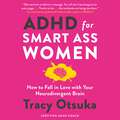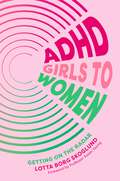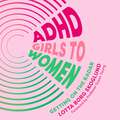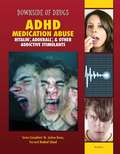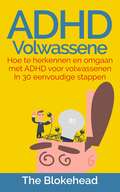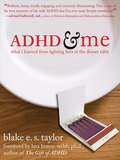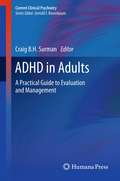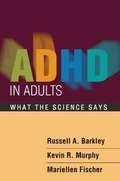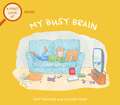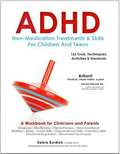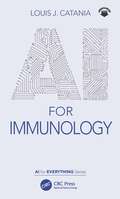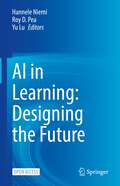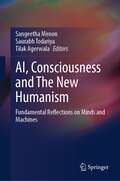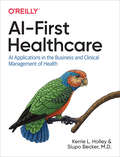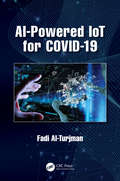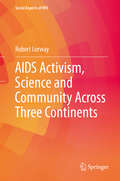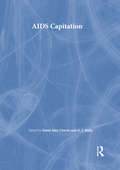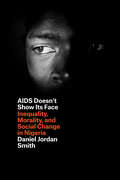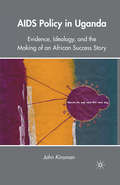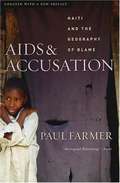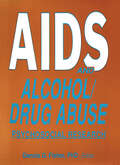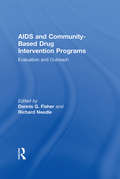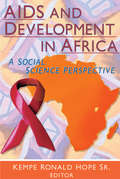- Table View
- List View
ADHD For Smart Ass Women: How to fall in love with your neurodivergent brain
by Tracy OtsukaADHD is one of the most common neurological disorders in the United States - yet a staggering 75 percent of girls and women remain undiagnosed. Due to the gender gap in medical research, which does not account for symptoms manifesting differently in women - leading to increased problems with anxiety, depression, working memory, sleep, energy and concentration - many ADHD women are left to navigate a society that fails to understand their struggles and gifts. But what if every woman had the resources and support to uncover the hidden wonders of her neurodivergent brain?Enter certified ADHD coach and podcast host Tracy Otsuka. Armed with her experience coaching thousands of women, cutting-edge medical research and personal insights from her own diagnosis, she presents a revelatory guide tailored specifically for girls and women with ADHD. In it, Otsuka offers an entirely new set of tools, systems, and strategies to access a world of boundless productivity, focus, and confidence.With her signature wit and levity - in entertaining chapters designed for ADHD readers - Otsuka explores the unique challenges that ADHD women face and illuminates the extraordinary qualities that set them apart: overflowing creativity, laser-focused attention, deep empathy, and fearless entrepreneurial spirit. Even without an official diagnosis, readers will be equipped with the tools to conquer any to-do list and to tap into their true purpose, personally or professionally. Otsuka offers a beacon of hope for any woman looking to transform her symptoms into strengths. Comprehensive, lively and long overdue, ADHD for Smart Ass Women is the key to unlocking unparalleled potential and to understanding your truly magnificent and brilliant brain.
ADHD Girls to Women: Getting on the Radar
by Lotta Borg SkoglundADHD girls and women often fall under the radar. Their lives impacted by a society that is largely disinterested in understanding ADHD outside of the male framework. No longer. This book connects the latest science on ADHD in women to the compelling lived experiences of girls and women with ADHD, weaving in their personal struggles and their breakthroughs, from childhood and the teen years through to motherhood, menopause and beyond.Family doctor, psychiatrist, and international ADHD expert Lotta Borg Skoglund combines years of experience in the treatment and assessment of ADHD with the powerful testimonies of the women she has encountered along the way, exploring issues such as hormonal changes, emotional regulation, organisation and concentration, relationships, work, and treatment. She provides valuable tips, strategies and insights as to how ADHD girls and women can achieve the self-understanding they need to live to their best potential.
ADHD Girls to Women: Getting on the Radar
by Lotta Borg SkoglundPopular science audiobook on ADHD in women interspersed with real stories from amazing ADHD womenADHD girls and women often fall under the radar. This rigorous and accessible audiobook connects current research (which until recently has mostly focused on men) to the lived experiences of girls and women with ADHD, weaving in their personal struggles and breakthroughs throughout their lives from childhood and the teen years through to motherhood, menopause and beyond.Family doctor, psychiatrist, and international ADHD expert Lotta Borg Skoglund combines years of experience in the treatment and assessment of ADHD with the powerful testimonies of the women she has encountered along the way, exploring issues such as hormonal changes, emotional regulation, organisation and concentration, relationships, work, and treatment. She provides valuable tips and insights along with powerful strategies as to how ADHD girls and women can achieve the self-understanding they need to live lives to their best potential.(P)2023 Jessica Kingsley Publishers
ADHD Medication Abuse: Ritalin®, Adderall®, & Other Addictive Stimulants
by Rosa WatersPeople with ADHD--attention-deficit/hyperactivity disorder--can be helped by medications such as RitalinTM and AdderallTM. Alternatively, other young adults are abusing these same drugs to their own detriment. Discover the true consequences of ADHD medication abuse, including the many health risks of taking these drugs. Learn how abusing ADHD medication can change your life for the worse. Discover the downside of ADHD medication abuse!
ADHD Volwassene: Hoe te herkennen en omgaan met ADHD voor volwassenen In 30 eenvoudige stappen
by The BlokeheadAttention Deficit Hyperactivity Disorder (ADHD) is altijd in verband gebracht met ontwikkelingsproblemen van kinderen. Alleen al in de VS stelt WebMD.com dat er ongeveer 8 miljoen volwassenen met dit probleem zijn en dat sommige van hen nog steeds niet gediagnosticeerd en dus onbehandeld zijn. Het begin van volwassen ADHD kan zijn begonnen in de kindertijd. Ongeveer 60% van de kinderen met ADHD brengt de symptomen naar volwassenheid. In sommige gevallen manifesteren de symptomen zich echter pas tijdens de volwassenheid en niet tijdens de jeugd. Of misschien zijn de symptomen nooit gediagnosticeerd tijdens de kinderjaren. Pak het boek om meer te leren
ADHD and Me: What I Learned From Lighting Fires at the Dinner Table
by Blake E. TaylorFrom being tied down to a kitchen chair by a frustrated babysitter, to foiling bullies, and launching rockets into neighbors' swimming pools, the stories from Blake Taylor's life with attention deficit/hyperactivity disorder (ADHD) are at times hilarious, poignant, and instructive. This eminently readable memoir sheds light on what it's like for a young person to grow up with, and suffer from, and ultimately learn to harness this common condition.
ADHD in Adults: A Practical Guide to Evaluation and Management (Current Clinical Psychiatry #0)
by Craig B.H. SurmanADHD in Adults: A Practical Guide to Evaluation and Management is the product of a unique collaboration of international specialists. This volume offers easy-to-read guidance, and includes checklists, rating scales and treatment planning tools. It was designed for a broad audience of caregivers working in diverse settings, including psychiatrists, social workers, primary care physicians, nurse specialists and psychologists. The authors are highly acclaimed clinicians, investigators and educators. They offer step-by-step guidance for implementation of best practices, drawing from clinical research and their experience treating thousands of patients. They cover diagnosis, treatment planning, and state-of-the-art application of pharmacology, psychotherapy, skill-building, family system and environmental interventions - for both simple and complex cases. The scales and worksheets in this Guide were developed to efficiently facilitate assessment and management. The Editor is an international leader in the field from the Clinical and Research Program in Adult ADHD at Massachusetts General Hospital (MGH) and Harvard Medical School, which has made pioneering and highly cited contributions to the understanding of ADHD. This Guide is a definitive, indispensable resource for all health providers who wish to optimize their approach to adult patients with ADHD.
ADHD in Adults: What the Science Says
by Kevin Murphy Russell BarkleyProviding a new perspective on ADHD in adults, this compelling book analyzes findings from two major studies directed by leading authority Russell A. Barkley. Groundbreaking information is presented on the significant impairments produced by the disorder across major functional domains and life activities, including educational outcomes, work, relationships, health behaviors, and mental health. Thoughtfully considering the treatment implications of these findings, the book also demonstrates that existing diagnostic criteria do not accurately reflect the way ADHD is experienced by adults, and points the way toward developing better criteria that center on executive function deficits. Accessible tables, figures, and sidebars encapsulate the study results and methods.
ADHD: My Busy Brain (A First Look At #32)
by Pat ThomasThe superb A First Look At series consists of a number of reassuring picturebooks that give advice and promote interaction between children, parents, and teachers on a wide variety of personal, social and emotional issues.This book provides a simple introduction to Attention Deficit Hyperactivity Disorder (ADHD). Its aim is to promote understanding and ongoing discussion with children who have ADHD or those who have siblings or classmates with it. It explains, in child-friendly terms, what ADHD is and what it feels like from the child's perspective. It also acknowledges the difficulties that those who do not have ADHD sometimes have in understanding those who do. Notes for parents and teachers at the back of the book provide valuable advice for how to share this book with your child or class. Written by a trained psychotherapist, journalist and parent, and illustrated by an experienced children's book artist, this title is part of an acclaimed and successful series of picture-book non-fiction for Early Years. Books in the series give advice and promote interaction between children, parents, and teachers on a wide variety of personal, social and emotional issues. They are excellent tools for teachers to use during classroom discussions.
AGENDA PARA SOLTERAS (EBOOK)
by Viviana Kahn" No te pasa que a la hora de completar un formulario, cuando te encontrás con el casillero estado civil, sobre todo después de haber llenado el ítem fecha de nacimiento, te sentís como si te empujaran a un abismo?", se pregunta la protagonista de estos reveladores relatos. No es fácil la vida cotidiana de la soltera con apuro. Como en una carrera de obstáculos, debe sortear con ingenio y elegancia todo tipo de situaciones embarazosas: eventos familiares, feriados, vacaciones y fines de semana interminables, miradas suspicaces y comentarios enjuiciadores de amigos y parientes, por no hablar de largos y tortuosos periodos de abstinencia sexual. Viviana Kahn nos propone en estas páginas un recorrido chispeante y genuino por aquellos lugares que suelen quedar afuera de la trillada agenda de las revistas femeninas. Un verdadero manual de estrategias para sobrevivir a los desencuentros, sobreponerse a la soledad y ser feliz contra todo pronóstico.
AI for Immunology (AI for Everything)
by Louis J. CataniaThe bioscience of immunology has given us a better understanding of human health and disease. Artificial intelligence (AI) has elevated that understanding and its applications in immunology to new levels. Together, AI for immunology is an advancing horizon in health care, disease diagnosis, and prevention. From the simple cold to the most advanced autoimmune disorders and now pandemics, AI for immunology is unlocking the causes and cures. Key features: A highly accessible and wide-ranging short introduction to AI for immunology Includes a chapter on COVID-19 and pandemics Includes scientific and clinical considerations, as well as immune and autoimmune diseases
AI in Learning: Designing the Future
by Hannele Niemi Yu Lu Roy D. PeaAI (Artificial Intelligence) is predicted to radically change teaching and learning in both schools and industry causing radical disruption of work. AI can support well-being initiatives and lifelong learning but educational institutions and companies need to take the changing technology into account. Moving towards AI supported by digital tools requires a dramatic shift in the concept of learning, expertise and the businesses built off of it. Based on the latest research on AI and how it is changing learning and education, this book will focus on the enormous opportunities to expand educational settings with AI for learning in and beyond the traditional classroom. This open access book also introduces ethical challenges related to learning and education, while connecting human learning and machine learning. This book will be of use to a variety of readers, including researchers, AI users, companies and policy makers.
AI, Consciousness and The New Humanism: Fundamental Reflections on Minds and Machines
by Sangeetha Menon Tilak Agerwala Saurabh TodariyaThis edited volume presents perspectives from computer science, information theory, neuroscience and brain imaging, aesthetics, social sciences, psychiatry, and philosophy to answer frontier questions related to artificial intelligence and human experience. Can a machine think, believe, aspire and be purposeful as a human? What is the place in the machine world for hope, meaning and transformative enlightenment that inspires human existence? How, or are, the minds of machines different from that of humans and other species? These questions are responded to along with questions in the intersection of health, intelligence and the brain. It highlights the place of consciousness by attempting to respond to questions with the help of fundamental reflections on human existence, its life-purposes and machine intelligence. The volume is a must-read for interdisciplinary and multidisciplinary researchers in humanities and social sciences and philosophy of science who wish to understand the future of AI and society.
AI-First Healthcare
by Kerrie L. Holley Siupo BeckerAI is poised to transform every aspect of healthcare, including the way we manage personal health, from customer experience and clinical care to healthcare cost reductions. This practical book is one of the first to describe present and future use cases where AI can help solve pernicious healthcare problems.Kerrie Holley and Siupo Becker provide guidance to help informatics and healthcare leadership create AI strategy and implementation plans for healthcare. With this book, business stakeholders and practitioners will be able to build knowledge, a roadmap, and the confidence to support AIin their organizations—without getting into the weeds of algorithms or open source frameworks.Cowritten by an AI technologist and a medical doctor who leverages AI to solve healthcare’s most difficult challenges, this book covers:The myths and realities of AI, now and in the futureHuman-centered AI: what it is and how to make it possibleUsing various AI technologies to go beyond precision medicineHow to deliver patient care using the IoT and ambient computing with AIHow AI can help reduce waste in healthcareAI strategy and how to identify high-priority AI application
AI-Powered IoT for COVID-19
by Fadi Al-TurjmanThe Internet of Things (IoT) has made revolutionary advances in the utility grid as we know it. Among these advances, intelligent medical services are gaining much interest. The use of Artificial Intelligence (AI) is increasing day after day in fighting one of the most significant viruses, COVID-19. The purpose of this book is to present the detailed recent exploration of AI and IoT in the COVID-19 pandemic and similar applications. The integrated AI and IoT paradigm is widely used in most medical applications, as well as in sectors that deal with transacting data every day. This book can be used by computer science undergraduate and postgraduate students; researchers and practitioners; and city administrators, policy makers, and government regulators. It presents a smart and up-to-date model for COVID-19 and similar applications. Novel architectural and medical use cases in the smart city project are the core aspects of this book. The wide variety of topics it presents offers readers multiple perspectives on a variety of disciplines. Prof. Dr. Fadi Al-Turjman received his PhD in computer science from Queen’s University, Kingston, Ontario, Canada, in 2011. He is a full professor and research center director at Near East University, Nicosia, Cyprus.
AIDS Activism, Science and Community Across Three Continents (Social Aspects of HIV #1)
by Robert LorwayThis book critically examines the many complex entanglements between AIDS activism and HIV science. It takes readers on a medical anthropological expedition across time and space that highlights the stakes from the perspective of those most affected by the epidemic. Author Robert Lorway reveals how early in the HIV epidemic, amid inadequate government leadership, communities of people living with and directly affected by HIV and AIDS rose to become a vital force at the forefront of prevention responses. Yet now, more than three decades later, HIV prevention and treatment is increasingly being placed under the jurisdiction of clinical, epidemiological, and management scientific expertise. In this kind of context, where does activism figure into the possibility of more democratized collaborations between affected communities, scientists, and policy makers? Coverage draws upon the findings from an array of community research projects conducted in Canada, India, and Kenya over a 22-year period. It weaves together rich, original data sources that range from in-depth qualitative interviews, field notes, and primary and secondary archival document retrievals in these three regions. Offering a rich diversity in perspectives, this book tackles the broader themes related to global health policy, science, and transnational activism at the same time as it highlights the experiences and local arenas where debates about activism and science play out. In the end, Lorway questions the growing expectation for affected communities themselves to produce sound evidence to legitimize their advocacy projects. He calls for the planners and implementers of biomedically oriented HIV research and interventions to more meaningfully engage with communities in ways that de-monopolize decision making as a matter of ethics and improved scientific practice.
AIDS Capitation
by David A CherinDiscover effective strategies for AIDS healthcare!You’ll definitely want to see what’s documented inside AIDS Capitation if you’re affiliated in any way with current efforts to bolster and improve healthcare policies and procedures for AIDS victims and their families. With this scholarly, up-to-date guidebook, you’ll find that your awareness and knowledge base concerning contemporary AIDS healthcare issues will expand and diversify, giving you a more stable information base from which you can make your own policy changes and civic organization improvements.If you’re a practitioner in HIV/AIDS care, an academic in HIV/AIDS research, or one of the many public officials currently involved in healthcare reform, you’ll find the guidance and proven strategies you need in AIDS Capitation. AIDS Capitation gives you a broad range of information including: descriptive and evaluative aspects of the model of care directions for implementing an innovative model of terminal home care modalities of care in end-stage treatment measurement issues in evaluative research help in measuring outcomes in community-based care funding opportunitiesWithout a doubt, the onset of HIV/AIDS has changed the way we view life. Our schools, government offices, and healthcare venues must change also. AIDS Capitation has everything you need to begin that process of change in your community.
AIDS Doesn't Show Its Face: Inequality, Morality, and Social Change in Nigeria
by Daniel Jordan SmithAIDS and Africa are indelibly linked in popular consciousness, but despite widespread awareness of the epidemic, much of the story remains hidden beneath a superficial focus on condoms, sex workers, and antiretrovirals. Africa gets lost in this equation, Daniel Jordan Smith argues, transformed into a mere vehicle to explain AIDS, and in AIDS Doesn’t Show Its Face, he offers a powerful reversal, using AIDS as a lens through which to view Africa. Drawing on twenty years of fieldwork in Nigeria, Smith tells a story of dramatic social changes, ones implicated in the same inequalities that also factor into local perceptions about AIDS—inequalities of gender, generation, and social class. Nigerians, he shows, view both social inequality and the presence of AIDS in moral terms, as kinds of ethical failure. Mixing ethnographies that describe everyday life with pointed analyses of public health interventions, he demonstrates just how powerful these paired anxieties—medical and social—are, and how the world might better alleviate them through a more sensitive understanding of their relationship.
AIDS Policy in Uganda: Evidence, Ideology, and the Making of an African Success Story
by John KinsmanThis book presents a history of AIDS control in Uganda, from the start of the epidemic in the early 1980s up until 2005. Uganda is well known internationally as an AIDS 'success story', both for its bringing down HIV incidence and prevalence over the 1990s, and for its innovative approach to scaling up the provision of antiretroviral therapy.
AIDS and Accusation: Haiti and the Geography of Blame
by Paul FarmerExposes the racism inherent in the now-discredited supposition that AIDS came to the US via Haiti. (It was the other way around.) Award-winning author Paul Farmer, now working in Rwanda, updates this 1992 study with a new preface.
AIDS and Alcohol/Drug Abuse: Psychosocial Research
by Dennis FisherAIDS is the number one health issue facing the nation today. The way in which AIDS relates to substance abuse is explored by drug abuse researchers in this timely volume. A major focus of AIDS and Alcohol/Drug Abuse is on the problems of conducting AIDS research on racial minorities in this country. Bringing together experts in the field, this volume examines the specific obstacles and challenges researchers have faced in assessing and addressing the needs of underserved populations and maps routes and procedures that can improve both research and available health care services.This unique volume also focuses on aspects of HIV infection that have received little attention elsewhere. It includes the first information published in the open literature about intravenous drug use in Alaska. Another chapter highlights some little-known facts that relate substance abuse to HIV infection in the American Indian/Alaskan Native population, among whom--it has been predicted--a devastating epidemic of HIV infection is likely. Problems with prevention, research, and treatment of individuals who are both intravenous drug users and who are infected with HIV are explored. Other chapters look at the transmission of HIV infection--by gay men who are alcoholics and by intravenous drug users. AIDS and Alcohol/Drug Abuse ends with hopeful chapter for AIDS prevention. Readers interested in the relationship of intravenous drug use and HIV infection, particularly among racial and ethnic minorities, will find this to be a practical, readable book. In particular, substance abuse counselors and researchers, and anyone involved in the AIDS prevention movement will find a valuable wealth of information.
AIDS and Community-Based Drug Intervention Programs: Evaluation and Outreach
by Dennis Fisher Richard NeedleDelve into the uncharted territory of the “hidden” drug addict--users who are not in treatment, not incarcerated, and not officially accessible for research purposes through traditional means. AIDS and Community-Based Drug Intervention Programs describes short-term interventions used to reduce the odds that these drug users will get infected by the Human Immunodeficiency Virus (HIV). The book explains new methods that are being developed, such as targeted sampling, social network analysis, geomapping, and other amalgams of both quantitative and qualitative approaches, that need to be forged to overcome the challenges of the war against AIDS. The research described in this important book was conducted under the Cooperative Agreement for AIDS Community-Based Outreach/Intervention Research funding mechanism of the National Institute on Drug Abuse (NIDA). Chapters include research on several ethnic groups, including Alaska natives, Puerto Ricans, and Navaho teens. AIDS and Community-Based Drug Treatment Programs, written by experts in the field, is a broad-based treatment of the subject by those who are actually doing the work in the trenches. Authors cover topics such as: the use of goal-oriented counseling and peer support to reduce HIV/AIDS risk quantitative and qualitative methods to assess behavioral change among injection drug users (IDUs) the importance of sampling from hidden populations in research a public health model for reducing AIDS-related risk behavior among IDUs and their sexual partners characteristics of female sexual partners of IDUs strategies used to implement random sampling strategies in the recruitment of out-of-treatment crack and IDUs ethnographic analysis of intravenous drug use analysis of contact tracing strategies employed to combat the AIDS epidemic the use of pile sorts to enhance other tools used by drug prevention programsAIDS and Community-Based Drug Intervention Programs is full of current research and useful information for professionals interested in learning about strategies for conducting HIV/AIDS research among hard-to-reach populations. Substance abuse researchers, treatment professionals, and people involved in AIDS prevention programs, state and county health departments, and criminal justice systems will find much relevant and important information to use in their daily work.
AIDS and Development in Africa: A Social Science Perspective (Haworth Psychosocial Issues Of Hiv/aids Ser.)
by R Dennis Shelby Kempe Ronald Hope, SrAIDS and Development in Africa: A Social Science Perspective is the first book-length treatment of both the impact of AIDS in Africa and an assessment of intervention strategies in varying cultural situations. Developed from revised selected papers from the nineteenth Southern African Universities Social Science Conference, AIDS and Development in Africa will be of interest to counselors, medical and development practitioners, Africanists, and AIDS researchers. From this book, you will find wide analytical coverage of the issues and country case studies related to the contributory factors and development impact of the HIV/AIDS pandemic in Africa. You will also explore the ability of countries to willingly promote and cope with the pandemic in the context of their different economic circumstances.Specifically in AIDS and Development in Africa, you will read about: socioeconomic context of AIDS social scientific explanations of the AIDS pandemic in Africa HIV/AIDS and the status of women in Botswana and Swaziland sexual abuse and HIV/AIDS law and HIV/AIDS orphans of the AIDS pandemic media and the African context of social construction human resource development and training in relation to HIV/AIDS in ZambiaAIDS and Development in Africa uses a multidisciplinary social science perspective in case studies of such countries as Botswana, Swaziland, Zimbabwe, South Africa, Malawi, and Zambia to reveal contributory factors and the developmental impact of HIV/AIDS in Africa. This book demonstrates the human consequences of AIDS and the efforts being made by governments, individuals, families, villages, communities, and national government organizations to respond to the pandemic. For example, you will learn about information campaigns and peer education approaches that are successfully increasing transmission awareness and condom use. You will read beyond the usual analysis of demographics and receive much more substantial assessments and analyses of the burden on people, economies, and health care systems of the African countries. AIDS and Development in Africa is indispensable to anyone who is involved with HIV/AIDS prevention/intervention in Africa. This comprehensive book provides you with essential and up-to-date research on the many issues surrounding Africa’s HIV/AIDS pandemic.
